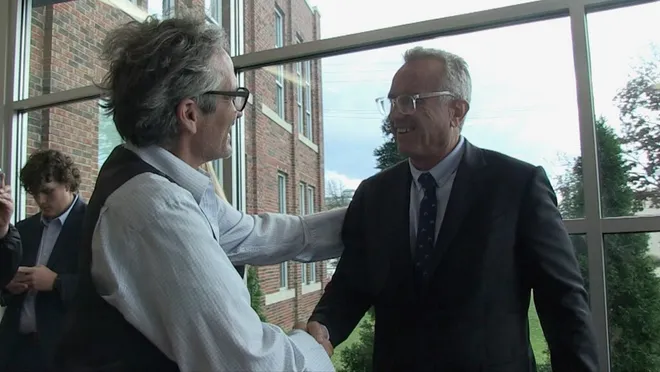Robert F. Kennedy Jr. asked me to show him around Flint.
Now, I’m not advocating for Junior. But if a man running for president wants to hear how we’re doing in Michigan, then I would certainly cut out an afternoon. I’d do the same for Biden or Trump or Attila the Hun.
The announcement that he’s running as an independent has turned the election on its ear. Junior is polling around 15% in a three-way Democratic race. At minimum, he could tilt the election toward one direction.
Who Kennedy is, exactly, is still unknown. It’s not enough to express distrust for the institutions that have failed us. Everybody knows that. The UAW is on strike. The bond market is in free fall. Ukraine is at a stalemate, and Israel has suffered a devastating terror attack.
Suddenly, RFK Jr.’s idea to clip the federal deficit by slashing military spending seems naïve.
But all politics are local, and here was Junior, 69, in Vehicle City, dressed in saddle boots and a dark suit and tie, the top button of his Oxford undone as the collar was too small to accommodate his neck. Junior is fibrous and robust; don’t let the weak voice fool you.
First stop was the picket line at the General Motors Flint processing center, a sprawling warehouse at the edge of town. Workers there told him about the miserable working conditions, the lack of windows, the forced 10-hour days.
The picketers imagined at that very moment half the GM executive team working on a contractual counteroffer while the other half was scheming a five-year plan to move what’s left of U.S. operations to Mexico.
“Well, there is no legal way to keep these auto companies in America,” Kennedy told them. “But with all the subsidies the car companies received from the taxpayer, they have an obligation to keep these plants here and to share the profits.”
After 10 minutes of walking in circles with a stick and placard, Junior was off to the Flint River where he met citizens poisoned in the great water debacle.
Kennedy, who makes his bread as an environmental lawyer, got an earful from Melissa Mays and Arthur Woodson. The pair filled Junior’s head with miserable details of illnesses, deaths and a government/business clique that has never been held accountable.
“All the criminal charges have been dropped in order to protect this pipeline and the Wall Street investors,” Mays tells him. “We’re called conspiracy theorists and crazies. We were called that from day one.”
No one in America knows more what it feels like to be tagged as a kook and a crazy than RFK Jr. “It’s the Democratic Party,” he says. “The Republican Party. Corporate control.”
Then it was off to city hall to meet Councilman Eric Mays, the ebony to Kennedy’s ivory. The deep baritone to the warbling tenor. Two thorns embedded in the hide of an entrenched establishment.
Ironically, the men stood next to a broken water fountain outside the office of the Flint mayor, a doorman for the Democratic machine.
The men discussed the failed prosecution for the water poisoning and the paltry settlement supported by Gov. Gretchen Whitmer, capping payments to some adults at $1,000 while lawyers lined their pockets with roughly $180 million.
At that moment, the stock markets close for the day. Wall Street rejoiced on the news that paychecks were shrinking for working people.
“It’s not a good thing if big business, which run the Democrats and Republicans, thinks it’s a good thing that people have low wages,” Kennedy said.
I asked if he knew the price of a gallon of milk. The question is an old journalism canard.
Still, Junior did not know ($3.75 on average).
“Good,” I said. “Men don’t drink milk. But a six-pack and smokes is twenty bucks now. Remember it, sir.”
And with that, the tour was over.








